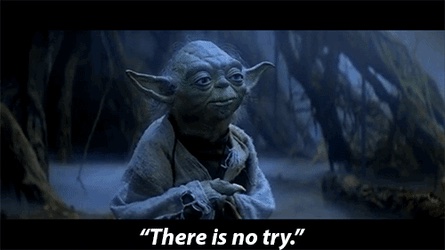This is going to sound a little silly, so bear with me.
I’ve often witnessed statements in daily Scrums/stand-ups, along the lines of:
- I might…
- I’m working on…
- I’ll try…
- Still busy with…
And while I’m sure they’re all true, and the motivation is good, this is all very passive and open-ended. There’s no commitment. Yes, I’m sure you fully intend to work hard and do a good job. And you’ll probably deliver as you thought. But you didn’t say that. You talked about what you would be doing, not what would be done. The difference is subtle, but powerful. I’m reminded of Kennedy’s Rice Stadium moon speech. Feel free to pause here while you go and read that manuscript. Seriously. I’ll wait. It’s a great read. Now consider the language used. JFK never once said “try”, “attempt” or “might”. He instead uses “will” and “shall”:
…we shall send to the moon…
PRESIDENT JOHN F. KENNEDY, 12 September 1962, Rice University Stadium
But he didn’t just say what would be done, he put a time-box around it!
…and it will be done before the end of this decade.
PRESIDENT JOHN F. KENNEDY, 12 September 1962, Rice University Stadium
And so they did. Seven years later, Americans walked on the moon. Did they get there because Kennedy said “we will” instead of “we’ll try”? No, of course not. They got there through an unimaginably humongous amount of incredibly difficult work, diligence and discipline. Not to mention the industrial and financial support of an entire super-power. But all of this was backed by the will. We will. Done deal. Now let’s figure out the details. NOT “let’s see if this is possible”. Declare it to be so, then work to make it happen. I’ve said it before and I’ll say it again:
Start with the win
Grumpy
Think about what you are saying and how it sets you up for the day. What’s the expectation? Where’s the will?
- I will…
- I shall…
- I intend to…
And if you’re tempted to argue “but I’m busy with something that’s going to take two weeks!” then re-frame that. You’re only working on one aspect at a time, right? That’s the bit you commit to. “I’ll get the widget-rotation component finished today”.
If you state in your morning stand-up that you’re “working on”, or “continuing with”, or even “trying to”, you’ve given yourself no actual goal. Words have power. Even (especially?) when they’re self-targeted words. By saying “I will publish the first draft of the new CI/CD process today”, you’ve set yourself up to do just that. It will settle in the front of your mind and help keep you focused. Move the focus from what you’re doing to what will be done.
I can already hear the naysayers… “But what if I fail? Everyone will remember that I promised something and didn’t deliver it…”, and yes, that’s true. They’ll also remember that you’re a human too, just like them, and things don’t always work out as planned. It’s also possible that by carefully phrasing things more specifically, you’re more likely to make positive progress every day. I will. No question. Of course I will. Now I’m going to figure out how.
The magical power of the word isn’t bound to agile development ceremonies. Try it out on your next DIY project. Instead of “I’m going to start redecorating the spare room”, set yourself up for success with “Today I will clear the furniture out of the spare room, dispose of what we’re not keeping, wash the walls and vacuum the carpet”.
Still skeptical? I dare you to experiment, then leave me a comment with your findings.

Comments